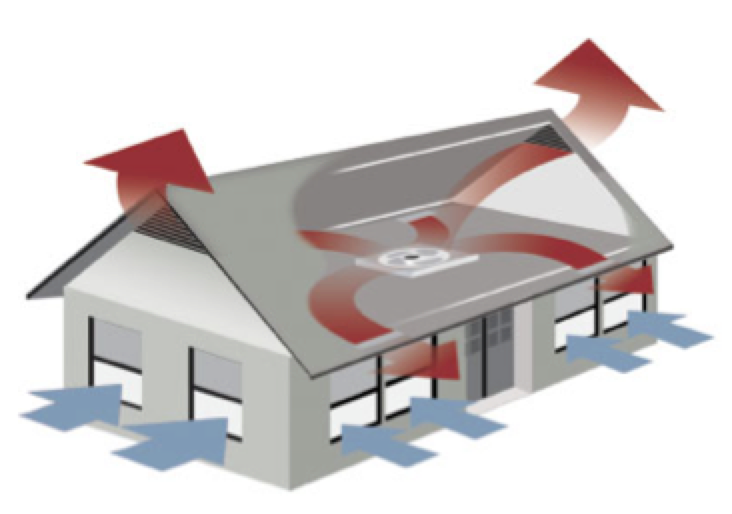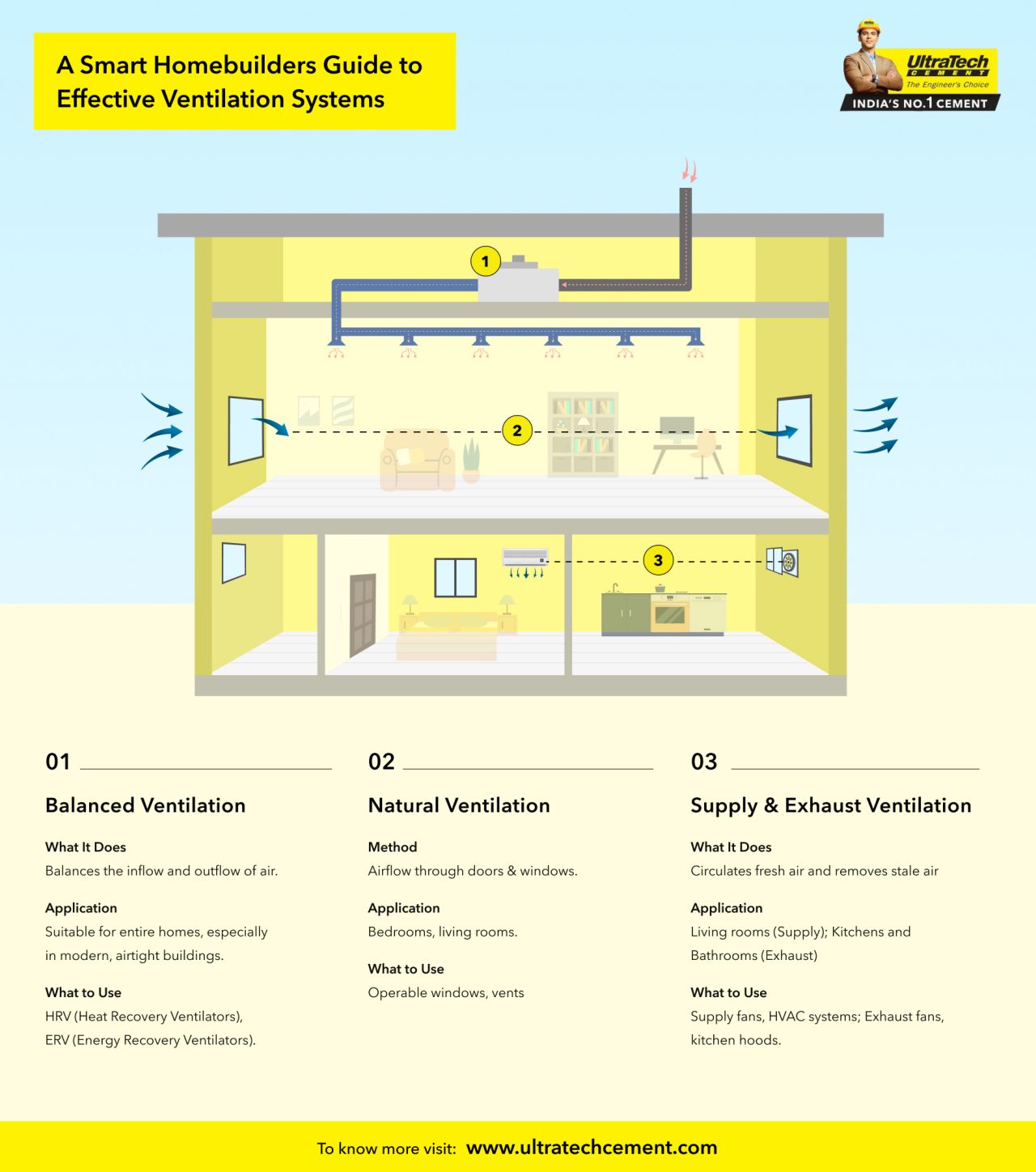The Function of Home Ventilation in Preventing Mold And Mildew and Indoor Allergens
Home ventilation is an important component in maintaining a healthy indoor environment. It manages humidity degrees, which can avoid the development of mold and the build-up of allergens. Numerous house owners ignore the value of proper ventilation, frequently leading to undetected concerns. Recognizing exactly how ventilation systems function and their influence on air high quality might be the key to a healthier living room. What steps can be required to improve these systems effectively?
Comprehending Home Air Flow Equipments
While several house owners might neglect the importance of air flow, comprehending home air flow systems is necessary for preserving interior air quality and avoiding mold growth - Home Ventilation Melbourne. These systems promote the exchange of stagnant interior air with fresh outside air, successfully decreasing pollutants and dampness degrees. Common kinds include all-natural ventilation, which relies upon wind and temperature differences, and mechanical ventilation, which uses followers and air ducts to regulate air movement. Additionally, balanced ventilation systems incorporate both methods to maximize air quality. Correctly developed and preserved ventilation systems can assist control temperature and humidity, making sure a comfy living atmosphere. Property owners ought to think about elements like home climate, occupancy, and layout when selecting a ventilation system to finest match their demands and improve overall air high quality
The Influence of Humidity on Mold Development
Moisture plays a crucial role in mold growth, making it a crucial aspect for home owners to monitor. Mold flourishes in atmospheres where humidity levels go beyond 60%, as these conditions supply the moisture necessary for spores to multiply and sprout. High humidity can arise from various resources, consisting of bad air flow, water leaks, and food preparation or bathing tasks. When humidity levels continue to be elevated, mold and mildew can develop swiftly on organic materials such as timber, material, and drywall. Homeowners must utilize dehumidifiers and assure appropriate air flow in areas vulnerable to moisture, such as shower rooms and cellars. Preserving interior moisture between 30% and 50% can significantly reduce the threat of mold and mildew development, adding to a healthier living setting.
Determining Common Indoor Allergens
Interior atmospheres can nurture a range of allergens that affect health and convenience. Common indoor irritants include dirt termites, family pet dander, mold spores, and pollen. Dirt mites prosper in bed linens, carpets, and furniture, feeding on natural product and contributing to breathing concerns. Animal dander, made up of tiny flakes from skin and hair, can trigger sensitive reactions in delicate individuals. Mold and mildew spores, frequently existing in wet areas, can affect and multiply air quality. Furthermore, plant pollen can penetrate homes via open windows or on clothes. Recognizing these irritants is vital for keeping a healthy and balanced indoor atmosphere. Awareness of their existence allows property owners to take positive steps to reduce exposure and boost total interior air top quality.
Advantages of Correct Air Flow
Appropriate ventilation is vital for maintaining a healthy interior setting, as it assists to regulate air quality and reduce the buildup of pollutants. Adequate airflow helps with the exchange of exterior and interior air, thus thinning down unsafe materials such as unstable organic substances, allergens, and dirt. This procedure not only enhances comfort but also contributes to the overall health of passengers by lessening respiratory problems (Home Ventilation Melbourne). In addition, correct ventilation effectively manages humidity degrees, lowering the likelihood of mold and mildew development and cultivating a drier setting for health. Additionally, it can boost power effectiveness by making sure that home heating and cooling systems run extra efficiently, bring about lower energy expenses. Overall, appropriate air flow useful reference is an essential element in advertising a risk-free and healthy and balanced space

Tips for Improving Home Ventilation
Although several property owners might ignore it, improving home ventilation is essential for boosting air high quality and preventing mold and mildew growth. One reliable approach is to on a regular basis open home windows to advertise cross-ventilation, permitting fresh air to flow. Mounting exhaust followers in washrooms and cooking areas can effectively eliminate moisture-laden air, minimizing humidity levels. Homeowners ought to also consider using air cleansers with HEPA filters to record irritants and toxins. Frequently preserving a/c systems, consisting of altering filters, assurances peak air flow and effectiveness. Sealing leaks around doors and home windows can stop outdoors air from getting in, which assists keep a constant indoor environment. Finally, integrating houseplants can normally boost air top quality while including visual worth to the home.
Often Asked Questions
Exactly how Frequently Should I Tidy My Home Ventilation System?
Determining exactly how often to cleanse website here a home ventilation system relies on different factors, including use and ecological problems. Home Ventilation Melbourne. Typically, specialists suggest a detailed cleaning every 3 to 5 years to maintain ideal air flow and performance
Can Plants Help In Reducing Indoor Allergens?
Research shows that certain indoor plants might help in reducing allergens by enhancing air quality and boosting humidity. Their performance differs, and maintaining a tidy environment stays important for taking care of indoor allergens effectively.
What Kinds Of Air Filters Are Best for Mold And Mildew Prevention?

Are There Certain Air Flow Demands for Basements?

Just how Do I Know if My Air Flow Is Functioning Successfully?
To identify efficient air flow, one look at these guys ought to monitor moisture levels, inspect airflow through vents, and observe indicators of condensation or stagnant air. Normal evaluations can indicate whether the system appropriately distributes and exchanges interior air.
Comprehending how air flow systems function and their effect on air quality might be the key to a healthier living space. While several home owners might neglect the importance of air flow, understanding home ventilation systems is important for keeping indoor air top quality and stopping mold and mildew growth. Usual types include all-natural air flow, which relies on wind and temperature level differences, and mechanical ventilation, which uses fans and air ducts to manage air movement. Appropriate air flow is essential for maintaining a healthy indoor environment, as it helps to regulate air high quality and minimize the accumulation of toxins. Lots of home owners might forget it, boosting home air flow is important for enhancing air quality and avoiding mold and mildew growth.